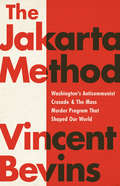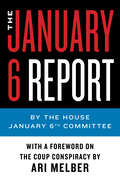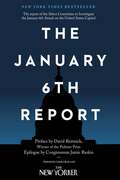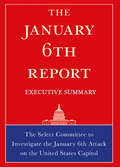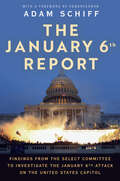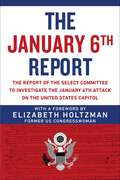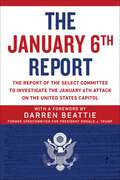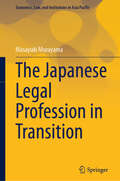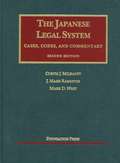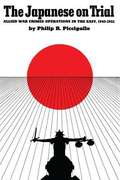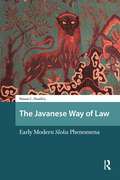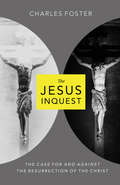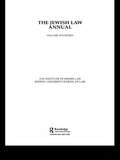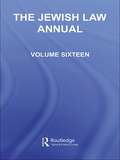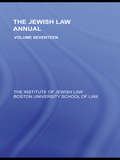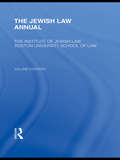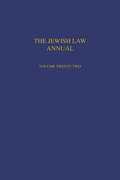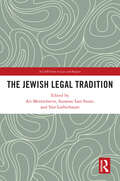- Table View
- List View
The Jailhouse Lawyer
by Calvin Duncan Sophie Cull&“Duncan&’s story is so incredible it strains belief. It is so heartwarming and hopeful that it will stay with you for a long time.&” —John Grisham"This brilliantly told story—at once maddening and miraculous—is among the most powerful indictments of our criminal justice system I&’ve ever read.&” —James Forman, Jr.A searing and ultimately hopeful account of Calvin Duncan, &“the most extraordinary jailhouse lawyer of our time&” (Sister Helen Prejean), and his thirty-year path through Angola after a wrongful murder conviction, his coming-of-age as a legal mind while imprisoned, and his continued advocacy for those on the insideCalvin Duncan was nineteen when he was incarcerated for a 1981 New Orleans murder he didn&’t commit. The victim of a wildly incompetent public defense system and a badly compromised witness, Duncan was left to rot in the waking nightmare of confinement. Armed with little education, he took matters into his own hands.At twenty-one, he filed his first motion from prison: &“Motion for a Law Book,&” which launched his highly successful, self-taught legal career. Trapped within this wholly corrupted system, Duncan became a legal advocate for himself and his fellow prisoners as an inmate counsel at the infamous Louisiana State Penitentiary, Angola. Literature sustained his hope, as he learned the law in its shadow.During his decades of incarceration, Duncan helped hundreds of other prisoners navigate their cases, advocating for those the state had long since written off. He taught a class in the midst of Angola to empower other incarcerated men to fight for their own justice under the law. But his own case remained stalled. A defense lawyer once responded to Duncan&’s request for documents: &“You are not a person.&”Criminal justice reform advocate Sophie Cull met Duncan after he was finally released from prison; he began to tell her his story. Together, they&’ve written a bracing condemnation of the criminal legal system, and an intimate portrait of a heroic and brilliant man&’s resilience in the face of injustice.
The Jailhouse Lawyer
by James Patterson Nancy AllenFrom James Patterson, the world's #1 bestselling author: a young lawyer takes on the judge who is destroying her hometown—and ends up in jail herself. <P><P>In picture-perfect Erva, Alabama, the most serious crimes are misdemeanors. Speeding tickets. Shoplifting. Contempt of court. Then why is the jail so crowded? And why are so few prisoners released? There’s only one place to learn the truth behind these incriminating secrets. Sometimes the best education a lawyer can get is a short stretch of hard time. <P><P><b>A New York Times Best Seller</b>
The Jakarta Method: Washington's Anticommunist Crusade and the Mass Murder Program that Shaped Our World
by Vincent BevinsNAMED ONE OF THE BEST BOOKS OF THE YEAR BY NPR, THE FINANCIAL TIMES, AND GQ&“A radical new history of the United States abroad&” (Wall Street Journal) which uncovers U.S. complicity in the mass-killings of left-wing activists in Indonesia, Latin America and around the world In 1965, the US government helped the Indonesian military kill approximately one million innocent civilians—eliminating the largest Communist Party outside China and the Soviet Union and inspiring other copycat terror programs. In this bold and comprehensive new history, Vincent Bevins draws from recently declassified documents, archival research, and eyewitness testimony to reveal a shocking legacy that spans the globe. For decades, it&’s been believed that the developing world passed peacefully into the US-led capitalist system. The Jakarta Method demonstrates that the brutal extermination of unarmed leftists was a fundamental part of Washington&’s final triumph in the Cold War.
The January 6 Report
by The January 6th CommitteeThe official report and findings of the bipartisan Congressional investigation into the January 6 attack on the Capitol, and Donald Trump’s related coup conspiracies to overthrow the election, with an original foreword by attorney and Emmy-winning MSNBC anchor Ari Melber. <p><p>This edition includes an exclusive breakdown of the coup conspiracy, based on Melber’s reporting and real-time coverage, highlighting the multi-pronged plot against democracy. Only the authoritative House committee report can capture the full range of plots that have been exposed over time, from the violent attack on January 6 to related efforts revealed months after the insurrection. This definitive edition features: • New independent analysis of the coup conspiracy by MSNBC Chief Legal Correspondent Ari Melber• The historic, official text of the House Committee report on the insurrection• The definitive accounting of Donald Trump’s efforts to end American democracy <p><p>This is the only edition of the report featuring an additional, original analysis of the coup by a journalist and lawyer at the center of the action—Melber has interviewed top members of this Committee, Jan. 6 rally planners and other cooperating witnesses, and Trump White House veterans ranging from Steve Bannon to Peter Navarro (now indicted for defying this probe). His report documents how Trump’s plots comprise a continuous coup conspiracy—not a “riot” that exploded in a “single day”—and why that factual prism is vital for accountability, justice, and preventing the next coup attempt. <p><P>In chilling detail, he shows how that process might have engineered a technical effort to “override” the election on the floor of Congress—an essential map, and warning, for those who wish to protect democracy. If warnings are ignored and there is no accountability for the plotters at the top, a failed coup may become a training exercise. This report is not only a vital document in modern American history, it can also inform efforts to protect the future of American democracy. As a matter of justice, bipartisanship, and even patriotism, this report will become essential reading for any American determined to defend our democracy. <p> <b>New York Times Bestseller</b>
The January 6th Report
by David Remnick Jamie Raskin Select Committee to Investigate the January 6th Attack on the United States CapitolCeladon Books and The New Yorker present the report by the Select Committee to Investigate the Jan 6 Attack on the United States Capitol. <p><p> On January 6, 2021, insurgents stormed the U.S. Capitol, an act of domestic terror without parallel in American history, designed to disrupt the peaceful transfer of power. In a resolution six months later, the House of Representatives called it "one of the darkest days of our democracy," and established a special committee to investigate how and why the attack happened. <p><p> Celadon Books, in collaboration with The New Yorker, presents the committee's final report, the definitive account of January 6th and what led up to it, based on more than a year of investigation by nine members of Congress and committee staff, with a preface by David Remnick, the editor of The New Yorker and a winner of the Pulitzer Prize, and an epilogue by Congressman Jamie Raskin of Maryland, a member of the committee.
The January 6th Report Executive Summary
by Select Committee on Jan 6thThe fastest way to understand the historic January 6th Report is this definitive edition of the Select Committee's Executive Summary of the Report to Investigate the January 6th Attack on the United States Capitol. The Summary is presented unedited and in its entirety, without the bias of introduction, commentary, or other punditry. <p><p> The result of thousands of interviews, testimony derived from the issuance of over 100 subpoenas, countless hours investigating telephone and internet records as well as analyzing audio, photo, and video evidence, the report uncovers an intricate scheme to overturn the results of the 2020 presidential election. <p><p> The central question of the report, answered in stunning detail here, is: How involved was the president of the United States? <p><p> Months in the making, this stark and gripping text will allow every American to learn for themselves what really happened at the Capitol of the United States on January 6th, 2021. <p><p> The Executive Summary of the January 6th Report is another in Melville House's series of carefully presented "pivotal public documents." (New York Times)
The January 6th Report: Findings from the Select Committee to Investigate the January 6th Attack on the United States Capitol
by The January 6 Select CommitteeThe official report by the Select Committee to Investigate the January 6th Attack on the United States Capitol, featuring an exclusive foreword on the state of American democracy by Congressman Adam Schiff On January 6, 2021, the United States came perilously close to losing its democracy. A mob instigated by the president of the United States violently attacked the Capitol Building in Washington, D.C., seeking to disrupt the certification of the electors in the presidential election and prevent the peaceful transfer of power for the first time in American history. The attack was the culmination of a plot organized and driven by a defeated president, attempting to remain in power through a complex web of deceit, intimidation, and violence. This is the official report of the investigation into the attack—perhaps the most vital congressional investigation in American history—with exhibits, witness testimony, and an exclusive foreword by Congressman Adam Schiff, who offers critical insights into this harrowing chapter in American history.
The January 6th Report: The Report of the Select Committee to Investigate the January 6th Attack on the United States Capitol
by Select Committee to Investigate the January 6th Attack on the US CapitolThe most important political investigation since Special Counsel Robert S. Mueller III&’s probe into Russian influence on the 2016 election of Donald J. Trump. The full report by the Select Committee to Investigate the January 6th Attack on the United States Capitol will feature facts, circumstances, and causes related to the assault on the Capitol Complex. Formed on July 1, 2021, the Select Committee has issued over one hundred subpoenas and held over a thousand witness interviews. The report will provide the results of investigations into interference with the peaceful transfer of power; the preparedness and response of the United States Capitol police and other federal, state, and local law enforcement; and the influencing factors that fomented the insurrection and attack on American representative democracy engaged in a constitutional process. The Select Committee investigation and the January 6th report will join the Mueller Report, the 9/11 Commission Report, the Warren Report, the Starr Report, and Watergate as one of the most important in history. The January 6th Report will be required reading for everyone with interest in American politics, for every 2020 voter, and every American. It is available here as an affordable paperback, featuring a foreword by Elizabeth Holtzman, a lawyer and political leader who was a Democratic Congresswoman from New York. Holtzman has a unique perspective on the situation, as she served on the House Judiciary Committee charged with investigating the Watergate scandal and prepared articles of impeachment that precipitated the resignation of President Nixon.
The January 6th Report: The Report of the Select Committee to Investigate the January 6th Attack on the United States Capitol
by Select Committee to Investigate the January 6th Attack on the US CapitolThe most important political investigation since Special Counsel Robert S. Mueller III&’s probe into Russian influence on the 2016 election of Donald J. Trump. The full report by the Select Committee to Investigate the January 6th Attack on the United States Capitol features facts, circumstances, and causes related to the assault on the Capitol Complex. Formed on July 1, 2021, the Select Committee has issued over one hundred subpoenas and held over a thousand witness interviews. The report will provides the results of investigations into interference with the peaceful transfer of power; the preparedness and response of the United States Capitol police and other federal, state, and local law enforcement; and the influencing factors that fomented the insurrection and attack on American representative democracy engaged in a constitutional process. The Select Committee investigation and the January 6th report joins the Mueller Report, the 9/11 Commission Report, the Warren Report, the Starr Report, and Watergate as one of the most important investigations in US history. The January 6th Report will be required reading for everyone with interest in American politics, for every 2020 voter, and every American.
The Japanese Banking Crisis of the 1990s: Sources and Lessons
by David Woo Akihiro KanayaA report from the International Monetary Fund.
The Japanese Legal Profession in Transition (Economics, Law, and Institutions in Asia Pacific)
by Masayuki MurayamaThis book focuses on the stratification of the Japanese legal profession and its impact on legal practice, drawing upon findings from two national surveys, one on Japanese lawyers (2018-19) and the other on Japanese people (2021), as well as qualitative data from interviews. Our research data clearly shows the increase of the lawyer population changed their whole world. Pressure from the lawyer population increase has not only made the stratification more visible but also diversified lawyers' career and their strategies of cultivating their legal service market. Legal practice is moving from professionalism to consumerism. Relying on retrospective data of individual lawyers' careers, this research shows how individual lawyers navigated their work and career and what have been major factors that affected their career paths. The research also shows a huge variety of lawyer's office management policies related with their market strategies. It is the first time that a national survey of lawyers was designed to obtain retrospective data of individual lawyers in Japan. This book gives a latest landscape of the Japanese legal profession in flux and the public view of changing legal practice.
The Japanese Legal System (Second Edition)
by Curtis J. Milhaupt J. Mark Ramseyer Mark D. WestThis casebook on Japanese Law has been specially designed for ease of use and theoretical versatility. Heavily-edited cases, statutes, and articles canvass a wide range of intriguing problems and theoretical perspectives. Professors will find that it facilitates a variety of analysis and approaches to a given question--whether sociological, anthropological, or based on law and economics. The book allows for in-depth coverage of a diverse range of substantive areas of law, from torts, criminal law, and contracts to employment and corporate law.
The Japanese Soldiers in Second World War Thailand: Grassroots Relations (Politics in Asia)
by Ichiro KakizakiKakizaki re-examines the real image of the Thai-Japanese alliance during the Second World War by focusing on the incidents and accidents that occurred during the passage through, or the stationing, of the Japanese army in Thailand.The book reveals the grassroots relations between Thais and Japanese by utilizing the records of incidents/accidents between Thais and Japanese during the war. The results show that although the number of incidents/accidents was large at the initial and the last stages of war, those caused by Thais were skyrocketing at the last stage of war while those caused by Japanese reached their peak at the initial stage of war before decreasing. Therefore, the real image of the Thai-Japanese alliance was the alliance of endurance that both Thais and Japanese had to be forced to endure the frequently-occurred incidents/accidents.A book for students and academics interested in the Thai/Southeast Asian war history during the Second World War.
The Japanese on Trial: Allied War Crimes Operations in the East, 1945-1951
by Philip R. PiccigalloThis comprehensive treatment of post-World War II Allied war crimes trials in the Far East is a significant contribution to a neglected subject. While the Nuremberg and, to a lesser degree, Tokyo tribunals have received considerable attention, this is the first full-length assessment of the entire Far East operation, which involved some 5,700 accused and 2,200 trials. After discussing the Tokyo trial, Piccigallo systematically examines the operations of each Allied nation, documenting procedure and machinery as well as the details of actual trials (including hitherto unpublished photographs) and ending with a statistical summary of cases. This study allows a completely new assessment of the Far East proceedings: with a few exceptions, the trials were carefully and fairly conducted, the efforts of defense counsel and the elaborate review procedures being especially noteworthy. Piccigallo's approach to this emotion-filled subject is straightforward and evenhanded throughout. He concludes with a discussion of the broader implications of such war crimes trials, a matter of interest to the general reader as well as to specialists in history, law, and international affairs.
The Javanese Way of Law: Early Modern Sloka Phenomena (Asian History)
by Mason HoadleyThe author's investigation of early-modern Javanese law reveals that judicial authority does not come from the contents of legal titles or juridical texts, but from legal maxims and variations thereof. A century and a half ago Simon Keyzer, a recognized scholar of Javanese law, noted that understanding of that law is dependent upon a grasp of such pithy expressions, which provide the key to the whole body of suits. (Preface, C.F. Winter, Javaansche Zamenspraken, 1858, which examines hundreds of sloka, the majority of which are directed to prevailing legal practice). Drawing upon the contents of 18th century Javanese legal texts, the present work builds upon Keyzer's and Winter's references to 'sloka-phenomena', namely sloka proper (maxims) and its derivatives sinalokan (that made of sloka), aksara here meaning legal principles, and prakara (matter, case). These are usually conveyed in vignettes illustrating their function and as a group, constitute the essence of traditional Javanese written law.
The Jealous Mistress
by Robert TraverRobert Traver first introduced America to his privileged inside view of the intricacies of the Law with the now classic novel Anatomy of a Murder. As a former district attorney, state supreme court judge, long-time legal practitioner and professional writer, Mr. Traver is particularly qualified to reveal the many nuances and vagaries of the Law with authority, insight and wit. In The Jealous Mistress -- an intriguing collection of accounts of actual legal cases -- Traver takes us on another expedition into the mysteries of the law. Some of the absorbing questions his cases raise are: Can a person inherit under the will of a testator he has murdered? Can a person be guilty of attempted murder if he used an empty gun? Have there been any instances of slavery in twentieth-century America? May a defendant in a murder case insist upon being hypnotized to aid in his defense? Is it indecent exposure for nudists to meet in private? Can a man legally be convicted of the rape of his own wife? Or of a sleeping woman? Or by impersonating the victim's husband? The reader will find a motley assortment of wrongdoers and wronged, of villains and victims, of foxes and lambs, of angels and knaves, of the arrogant and the bewildered, of informers and reformers. "Every legal case that ever happened is essentially a story," the author says in his Preface, "the story of aroused, pulsing, actual people fighting each other or the state for something: for money, for property, for power, pride, honor, love, freedom, even for life -- and quite often, one suspects, for the pure unholy joy of fighting." The Jealous Mistress shows the remarkable continuity of the law, its resilience and adaptability, and the dedication to justice of most of the legal profession. It also demonstrates, as Traver says, "that the law is the difference between a debate and an alley fight," and finally that "however chaotic and uncertain modern life might appear, we still live by the rule of Law."
The Jesus Inquest: The Case For and Against the Resurrection of the Christ
by Charles FosterCharles Foster thought he knew the familiar story of the resurrection of Jesus. He thought Christianity rested on sound historical foundations.But could he be wrong? Could Christianity be built on a terrible mistake or downright lie?As nagging doubts began to surface, Foster turned to countless Christian books to find comfort and proof. But all he found were more questions. What began as a personal quest for reassurance quickly turned into an in-depth examination of the most astounding historical claim of all time. He crawled through Jerusalem tombs, dusty libraries, and the recesses of his own mind in search of an answer. He turned the war in his head—the war between faith and doubt—into this heated, no-holds-barred debate, which presents the case both for and against the resurrection of Jesus.The Jesus Inquest takes you through medical evidence, Jewish burial practices, archaeological hypotheses, maps, ancient artifacts, the canonical and non-canonical gospels, biblical criticism, and much more, providing an unbiased examination of the facts of the case. A practicing trial attorney and University of Oxford academic, Charles Foster vigorously argues both sides of the issue, presenting information in compelling courtroom style and leaving no hard question unaddressed.The Jesus Inquest gives readers the tools necessary to debate the most remarkable and controversial event of world history—a debate so crucial and fascinating it cannot be ignored.
The Jewish Ethicist: Everyday Ethics for Business and Life
by Asher MeirA modern-day guide to the perplexed on everyday ethical issues and dilemmas in the workplace and the marketplace.
The Jewish Family Ethics Textbook (JPS Essential Judaism)
by Rabbi Neal ScheindlinJudaism offers us unique—and often divergent—insights into contemporary moral quandaries. How can we use social media without hurting others? Should people become parents through cloning? Should doctors help us die? The first ethics book to address social media and technology ethics through a Jewish lens, along with teaching the additional skills of analyzing classical Jewish texts, The Jewish Family Ethics Textbook guides teachers and students of all ages in mining classical and modern Jewish texts to inform ethical decision-making. Both sophisticated and accessible, the book tackles challenges in parent-child relationships, personal and academic integrity, social media, sexual intimacy, conception, abortion, and end of life. Case studies, largely drawn from real life, concretize the dilemmas. Multifaceted texts from tradition (translated from Hebrew and Aramaic) to modernity build on one another to shed light on the deliberations. Questions for inquiry, commentary, and a summation of the texts&’ implications for the case studies deepen and open up the dialogue. In keeping with the tradition of maḥloket, preserving multiple points of view, &“We need not accept any of our forebears&’ ideas uncritically,&” Rabbi Neal Scheindlin explains. &“The texts provide opportunities to discover ideas that help us think through ethical dilemmas, while leaving room for us to discuss and draw our own conclusions.&”
The Jewish Law Annual Volume 14 (Jewish Law Annual #14)
by The Institute of Jewish Law, Boston University of LawThe volume contains ten articles, including a penetrating analysis of the application of Jewish price fraud law to the workings of the present-day marketplace. Diverse in their scope and focus, the articles address legal, historical, textual, comparative and conceptual questions.The volume concludes with a survey of recent literature on biblical and Jewish law, and a chronicle section, which discusses recent Israeli and American court cases involving issues where Jewish law is of particular relevance, thereby making the Annual a journal of record.
The Jewish Law Annual Volume 16 (Jewish Law Annual #10)
by Berachyahu LifshitzVolume 16 of The Jewish Law Annual adds to the growing list of articles on Jewish Law that have been published in volumes 1-15 of this series, providing English-speaking readers with scholarly material meeting the highest academic standards. The volume contains seven articles diverse in their scope and focus, encompassing legal, historic, textual, comparitive and conceptual analysis, as well as a chronicle of cases of interest, and a survey of recent literature. Three of the articles, one of which explores references to Genesis in (western) canon law, make up a special section on the book of Genesis. The other topics covered are: suicide as an act of atonement in Jewish law; early interpretations of the Bible and Talmud as reflecting medieval legal realia; Ashkenazic codifiers in Spain; and authority, custom and innovation in the seventeenth-century Italian halakhic encyclopedia, Pahad Yitzhak.
The Jewish Law Annual Volume 17 (Jewish Law Annual)
by Berachyahu LifshitzVolume 17 of The Jewish Law Annual adds to the growing list of articles on Jewish law that have been published in volumes 1-16 of this series, providing English-speaking readers with scholarly articles presenting jurisprudential, historical, textual and comparative analysis of issues in Jewish law. The volume contains seven articles diverse in their scope and focus. Two articles are devoted to the halakhic thought of Rabbi A. I Kook; two treat classic legal questions: breach of a promise to marry, and the legal capacity of minors; two examine aspects of the judicial process, one exploring talmudic analyses of the biblical requirement that courts be established in every town, and the other, post-talmudic views on judicial authority in cases suspected of fraudulent claims. Another article addresses the fascinating question of the epistemic-pedagogic worldviews of the rival Tannaitic legal academics, the House of Hillel and the House of Shammai. The volume concludes with a section on Israeli legislation that adduces or is informed by Jewish law, and two reviews of a much-discussed recent book on a topic of considerable contemporary interest: the agunah problem.
The Jewish Law Annual Volume 18 (Jewish Law Annual #18)
by Berachyahu LifshitzVolume 18 of The Jewish Law Annual contains six comprehensive articles on various aspects of Jewish law. Three articles address family law. One addresses the painful issue of the plight of the wife whose husband withholds conjugal relations. In a marriage where relations are withheld, the wife may seek a divorce, while her husband may withhold divorce. Prolonged withholding of divorce renders the wife an agunah, that is, a wife chained to a dead marriage and unable to start anew and rebuild her life. The author explores the halakhic feasibility of allowing a wife in such a predicament to bring a claim for damages against her husband for infliction of mental distress. If such claims are allowed, recalcitrant husbands may rethink their intransigence and consent to grant the divorce. Another article examines the evolution of halakhic thinking on the parent–child relationship. It traces the stages by which halakhic family law changed from a basically patriarchal system in which both mother and the child were deemed subject to the father’s will, to a more balanced system where wife and husband have equal standing with respect to custody matters, and the best interest of the child is the main consideration in custody proceedings. In another article, halakhic attitudes to corporal punishment of children are analyzed. The author explores whether the "Spare the rod and spoil the child" adage, which is based on a verse from Proverbs, indeed reflects the position of Jewish law. He shows that in fact, while recourse to corporal punishment for educational purposes is permitted--subject to detailed qualifications that greatly limit its scope--two divergent approaches to corporal punishment can be discerned in the halakhic sources. One maintains that administration of corporal punishment can be a useful pedagogic tool of last resort, whereas the other seeks to minimize recourse to corporal punishment in the educational context, questioning its efficacy. The article shows that in any event, the notion that corporal punishment is required by the law, as some, invoking the "spare the rod" maxim, have maintained, is by no means borne out by the halakhic literature. The volume also features a fascinating article on the history of two societies founded in London to further the study of Jewish law using modern scholarly methodologies. One society was active at the end of the 1920s and beginning of the 1930s, the second was active a decade later. The article explains the background to the establishment of the societies and analyzes the societies’ objectives, leaders and memberships. Both societies were founded with the intention of reformulating the classic halakhic sources in a manner that would render them suitable for contemporary application in the nascent Jewish state. But as the author shows, ultimately much of their energy was devoted to presenting the said sources to the non-Jewish legal world, for the purpose of reciprocal enrichment and edification. Rounding out the volume are two jurisprudential studies on classic legal problems. The first explores the prohibition against seeking a second legal ruling when a ruling declaring something forbidden has been handed down. What is the scope of this rule, and in what ways does it differ from the res judicata principle in western law? The author shows that both procedural and substantive readings of the prohibition were put forward in the talmudic commentaries, and explains the jurisprudential implications of these different readings. The second article examines the question of the agent who breaches his principal’s trust, focusing on the case of the agent who executes the act he was sent to carry out, but does so for himself, rather than his principal. To what extent is he liable for ensuing damages to the principal, and is his act invariably deemed reprehensible? Another issue is the legal status of the transaction carried out by such an agent. Do the rights and obligations ge
The Jewish Law Annual Volume 22 (Jewish Law Annual #22)
by The Institute for Research in Jewish Law Faculty of Law the Hebrew University of JerusalemVolume 22 of The Jewish Law Annual adds to the growing list of articles on Jewish law that have been published in volumes 1–21 of this series, providing English-speaking readers with scholarly articles presenting jurisprudential, historical, textual and comparative analysis of issues in Jewish law. This volume features articles on rabbinic criminal law, tort law, jurisprudence, and judicial practice.
The Jewish Legal Tradition (ICLARS Series on Law and Religion)
by Ari Mermelstein, Suzanne Last Stone, and Yair LorberbaumThis book provides an in-depth exploration of the Jewish legal tradition, or halakhah, through the lens of modern legal philosophy. The interdisciplinary approach of the book makes complex ideas accessible, offering insights into how Jewish legal thought both parallels and diverges from modern legal theory. By examining primary sources through a contemporary legal-theoretical framework, the volume offers a pedagogical approach to halakhah. Readers will gain a nuanced understanding of the deep structure of Jewish law through the rigorous application of modern legal philosophy. The book’s structured approach, dividing chapters into conceptual discussions, primary source analyses, and synthetic reflections, provides a comprehensive guide for exploring Jewish legal thought. The collection not only enhances the study of halakhah but also contributes to broader discussions in legal theory and philosophy, making it a valuable resource for diverse audiences.The book is intended for scholars and students of Jewish law, legal theory, and Jewish studies. It is also designed for law schools, Judaic studies programs, and lay readers interested in the philosophical dimensions of religious legal systems.


